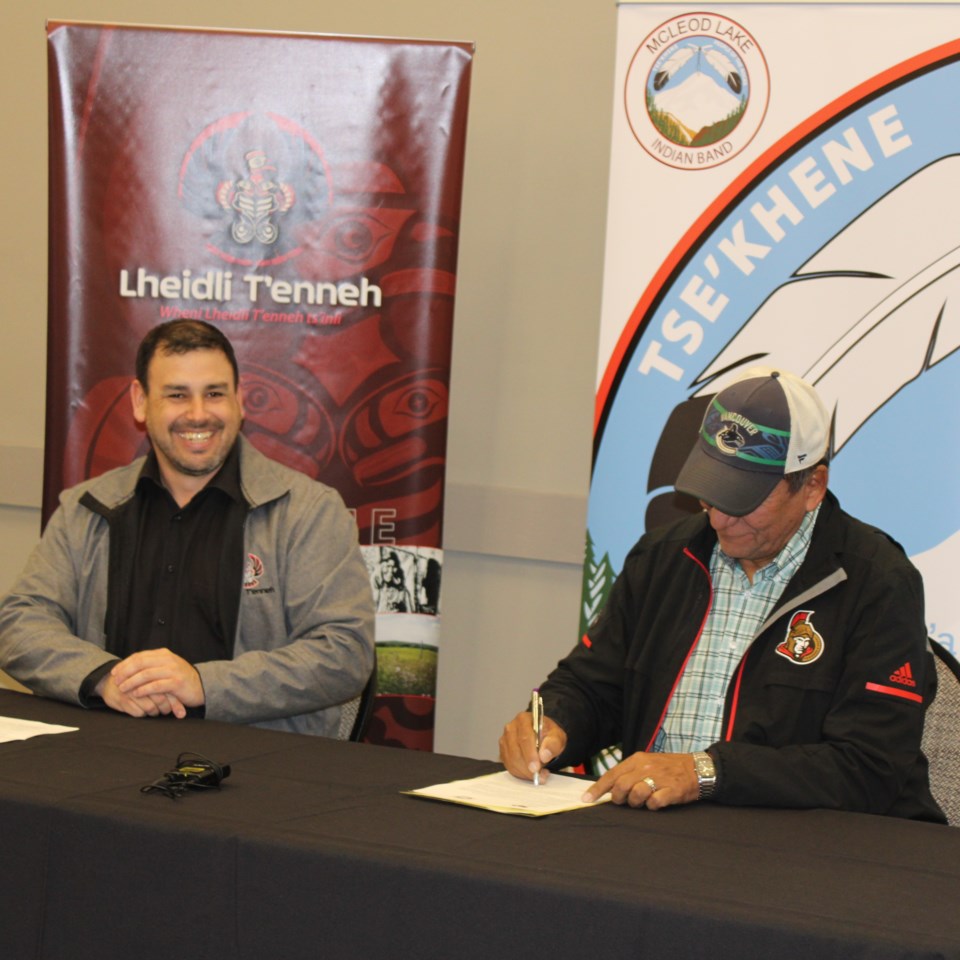Lheidli T'enneh Nation Dayi Clay Pountney and McLeod Lake Indian Band Chief Harley Chingee signed a letter to School District 57 on Tuesday calling for an addition of two Indigenous trustees to the school board.
"The only way our communities can ensure that our students and other indigenous students are receiving the support they deserve is for our communities to have a trustee making decisions at the board of education table," Pountney said in a statement.
The designation of trustees for the Robson Valley and Mackenzie was cited as a precedent for the move, which Pountney said would raise the number of trustees on the board to nine. He said the trustees would be elected by their respective band members.
"Someone who is qualified and would take on that workload, because a trustee job is not an easy job," Pountney added during a press conference at Uda Dune Baiyoh where the letter signing was held.
"This isn't a job where you just show up without having prior knowledge or being more aware of what's going on in the district. I don't know how many hours you'd have to put in during a week, but it's quite a bit."
The school board met on Tuesday night, but the letter was not discussed by the board. The package does include letters Pountney sent to the school board and to the Ministry of Education in June.
In the one to the school board, Pountney said the band had received a letter from Education Minister Rob Fleming that appears to follow on a similar call by Pountney made in May 2019 for an Indigenous trustee.
In it, he said that while Fleming said he does not have the power to appoint trustees as they are all elected positions, there is nothing preventing the board from having a Lheidli T'enneh members sit at the table during public board meetings on the understanding that they would not have the ability to vote.
Pountney went on to request that the school board appoint two Indigenous advisory board postions - one for LTN and one for MLIB - and then work with the ministry to amend the School Act to make them permanent voting positions or to create two trustee positions similar to those for the Robson Valley and Mackenzie.
In April 2018, Fleming announced the school district will be changed to a ward system for the coming election, with a trustee elected by voters in each of Mackenzie and the Robson Valley. The changes were made after requests by the District of Mackenzie, the Regional District of Fraser-Fort George and the Village of Valemount.
It was not popular with trustees at the time. A letter sent by board chair Tim Bennett to Fleming said that trustees had voted unanimously to support the current at-large system.
On Tuesday, flagging graduation rates among Indigenous youth, a bigger say on how money designated for Indigenous students is spent and the United Nations Declaration of the Rights of Indigenous Peoples were among the reasons cited by Pountney and Chingee for demanding the Indigenous trustees.
Chingee said it is part of a larger strategy to ensure members are "getting educated, getting a good job, earning a good living."
On Tuesday night, Bennett said the board is planning to meet with the Lheidli T'enneh and McLeod Lake Indian Band councils to discuss the issue. Bennett said the board has previously met with Pountney and the Lheidli T'enneh council regarding the issue.
"We heard this is their number one educational priority and, as a board, we need to respond to that. These are conversations the board looks forward to having," Bennett said. "We're being asked for our support... but ultimately the decision is from the Ministry of Education."
Students who self-identity as Indigenous normally make up more than 30 per cent of the student population in School District 57, he said.
There may be many more students of Indigenous heritage who haven't self-identified, Bennett added. The school district is working to answer questions families have about self-identifying, he said, and the district may see higher numbers as Indigenous families and students opt to self-identify as Indigenous.
While the district has recently seen the graduation rates for Indigenous students on the rise, the graduation rate remains well below that of non-Indigenous students, Bennett said.
"Our Indigenous graduation rates have not even hit 70 per cent," he said. "We have a long way to go to bring those rates up to (the rate for non-Indigenous students), or even higher."
— With files from Arthur Williams



